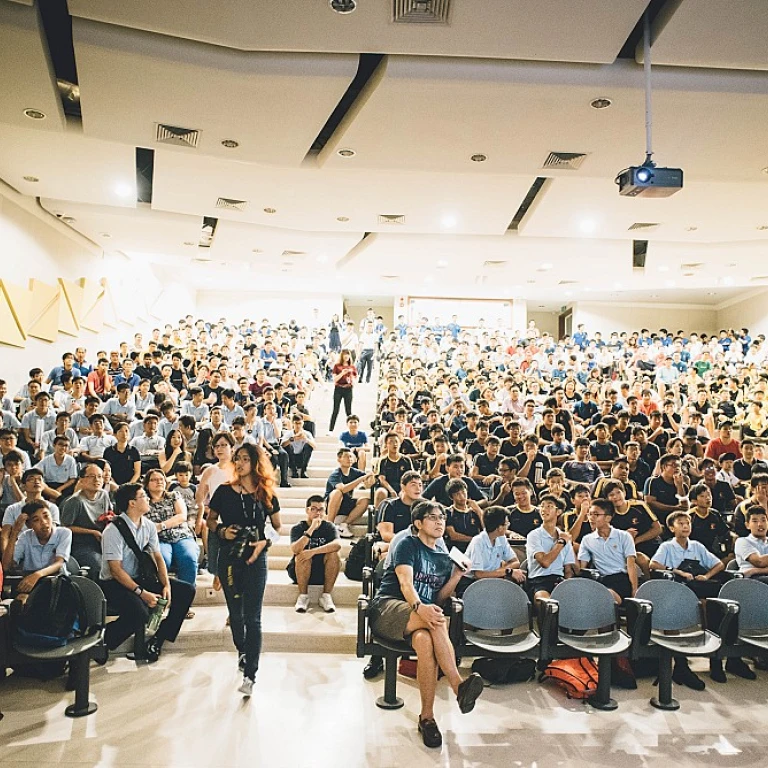
Embracing the Digital Revolution in Office Management
Stepping into a Digital Office Ecosystem
Efficient office management is the backbone of a thriving company. With 'office management strategy' and 'digital transformation' ranking high in SEO analytics, it's evident that integrating advanced technology is not just a trend, but a necessity. As our workplaces evolve, the digital revolution stands at the forefront, offering unmatched possibilities for increased efficiency and productivity. A recent survey by McKinsey & Company revealed that companies who have embraced digital technologies are 50% more likely to report enhanced customer satisfaction, indicative of the direct impact on office management efficacy.
- Streamlined Communication Systems
- Cloud-based Project Management Tools
- Advanced Scheduling Platforms
Digital tools not only optimize work processes but also promote an environment of continuous improvement, a vital component for staying ahead in the competitive business landscape.
Revolutionizing Workflow with AI and Automation
Imagine a world where 'workflow efficiency'and 'automation' are not just buzzwords but the cornerstones of your office management approach. AI's ability to optimize routine tasks—such as scheduling meetings or sorting emails—frees your team to concentrate on complex projects that demand a human touch. Statista reports that by leveraging automation, businesses can expect a 60% reduction in office tasks, establishing AI as a transformative power in the modern office setting.
Subtle AI integrations include:
- Virtual Assistants- Smart Email Filtering- Automated Report Generation
Each innovation not only affords more time for strategic operations but also minimizes human error, crafting an efficient and error-resistant workplace.
Optimizing Office Operations with the Internet of Things (IoT)
By harnessing the 'Internet of Things,' offices transform into hives of connectivity, with devices communicating seamlessly to optimize the environment and operations. IoT has the potential to influence workspaces profoundly, with the Global Workforce Analytics forecasting IoT to save companies up to $11,000 per employee per year through improved productivity and reduced office costs. Smart thermostats optimizing energy use, to intelligent security systems, IoT devices offer a range of applications that can revolutionize the way we manage offices.
Key IoT deployments:
- Energy Management Systems
- Smart Security Solutions
- Inventory Tracking Sensors
This interconnectedness not only curtails unnecessary expenditures but also amplifies employee's ability to interact with their physical workspace in a meaningful way.
Fostering Data-Driven Decisions
'Data analytics' is more than a keyword; it's a paradigm shift in making fact-based decisions in office management. Incorporating analytics allows managers to identify patterns, forecast trends, and make strategic choices that propel business growth. According to Forbes, companies that adopt data analytics can see an 8-10% increase in profit, translating ideas into dollars. Data-driven strategies ensure that decisions are not made on hunches but are substantiated by concrete metrics, resulting in more successful outcomes.
Practical applications of data analytics include:
- Employee Performance Tracking
- Resource Allocation
- Customer Feedback Analysis
With these tools, office managers become strategists, navigating the corporate seas with a compass of verified data.
Humanizing High-Tech Environments
As we integrate 'employee satisfaction' with 'high-tech solutions', it's crucial to strike a balance ensuring that technology serves as an enabler of human potential, not a replacement. Employee satisfaction figures prominently in SEO, with a strong correlation to overall business success. Gallup's research shows that highly engaged teams show a 21% increase in profitability. By embracing tech solutions that employees value and find user-friendly, companies encourage a culture of innovation and contentment. The challenge lies in aligning technology that complements the human element of the workplace.
Ideas for integrating employee satisfaction with technology:
- Flexible Remote Work Technologies
- Interactive Training Platforms
- Health and Wellness Apps
The juxtaposition of advanced tools with mindful office management practices can lead to an office environment where both the company and its employees thrive.
AI and Automation: The Future of Office Workflow Efficiency
The Dawn of the Digital Era in Modern Workspaces
As an expert Office management analyst, it's clear that the advent of digital technology is revolutionizing every aspect of business operations. In the modern workspace, an office manager must leverage digital revolution strategies to stay competitive. According to a study by McKinsey, companies that digitize processes can expect to see a 20-50% increase in economic benefits. The integration of digital tools streamlines communication, automates mundane tasks, and facilitates remote work—an essential capability in today's global market.
Streamlining Communication with State-of-the-Art Platforms
Effective communication is the backbone of successful office management. By implementing collaborative platforms like Slack, Asana, or Trello, managers can increase productivity by up to 30%, as reported by the Salesforce State of Collaboration report. These platforms enable teams to stay connected, share documents, and manage project timelines with unprecedented ease, thus propelling an office's workflow into a new dimension of efficiency.
- Enhanced interdepartmental collaboration
- Reduced email clutter
- Centralized information repository
Automating Routine Tasks to Boost Operational Efficiency
Automation in office management isn't just a trend; it's a strategic imperative. Automating repetitive tasks like scheduling, data entry, and reporting not only frees up time for strategic planning but also reduces human error. As per the Smartsheet Automation in the Workplace report, nearly 69% of workers believe that automation could help reduce wasted time. Office managers who embrace automation set their teams up for success, allowing them to focus on innovation and growth.
Enabling Remote Work with Cutting-Edge Tech
Remote work is more than just a passing fad; it's become a critical component of modern office management. An Owl Labs report illustrates that companies that support remote work have 25% lower employee turnover than those who don't. Embracing technologies that facilitate telecommuting, such as VPNs, cloud services, and video conferencing platforms, is essential for attracting and retaining top talent in today's workforce, thus ensuring continuous operational productivity.
The digital revolution in office management is a multifaceted movement that requires insight, adaptability, and a forward-thinking approach. By tapping into digital tools, an office manager not only optimizes the workplace today but also future-proofs their strategies for the challenges and opportunities ahead.
The Role of IoT in Enhancing Office Operations
Incorporating Artificial Intelligence for Efficient Workflows
Artificial Intelligence (AI) and machine learning are reshaping office management strategies with their remarkable capabilities. These advanced technologies streamline everyday tasks, which directly impacts productivity and efficiency. For instance, AI-powered chatbots can significantly reduce administrative workload by handling routine inquiries, scheduling meetings, and managing emails. This AI integration leads to an impressive uptick in free time for office managers, allowing them to concentrate on other critical tasks. According to a report by McKinsey, 60% of all occupations have at least 30% of activities that are automatable, which positions AI as a fundamental tool for enhancing office workflow efficiency.
Automating Routine Tasks to Increase Productivity
Automation utilizes software to perform repetitive and time-consuming office activities, such as data entry, report generation, and even complex scheduling tasks. This technological shift is about maximizing the use of cutting-edge software to eradicate inefficiencies in the office environment. For example, productivity can increase by automating the process of data collection and entry, with statistics revealing that automation can raise productivity growth globally by 0.8 to 1.4 percent annually according to a study by the International Federation of Robotics. These measurable improvements attest to the pivotal role automation plays in the future of office management.
Smart Integration of AI for Improved Decision-Making
An intriguing benefit of AI in office management is its ability to assist in decision-making processes. AI systems can analyze vast amounts of data to surface insights and trends, empowering office managers to make faster, more informed choices. When AI takes on the heavy lifting of data analysis, it ensures that decisions are data-driven and evidence-based. As per insights from IBM's Institute for Business Value, data-driven organizations are 23 times more likely to acquire customers, a statistic that can’t be overlooked by those eager to advance their office management strategies with AI and automation.
Leveraging AI for Enhanced Customer and Employee Experiences
Employee satisfaction plays a significant role in the success of any organization. AI-infused office management techniques can lead to a more engaging workplace for employees. AI solutions can also enhance customer service by providing timely, personalized responses to customer queries, transforming customer experience significantly. Implementing AI can result in a 14% increase in employee productivity and a 19% increase in customer satisfaction, as reported by Salesforce's "State of the Connected Customer". These statistics show the transformative potential of AI on both the internal and external facets of a business.
Customizing AI Solutions for Specific Office Needs
It's essential for office managers to recognize that AI and automation must be tailored to meet the unique needs of their office operations. By identifying specific pain points and selecting the right AI tools to address them, managers can ensure a smoother integration and realize the full benefits of these technologies. Custom-built AI applications can cater to niche office tasks and lead the charge in transforming office management strategies. A report by Accenture states that AI could double annual economic growth rates by 2035, indicating that the deliberate customization of AI tools is not only strategic but potentially revolutionary for office management.
Data Analytics: Making Informed Decisions in Office Management
Revolutionizing Office Operations with IoT Technology
In today's fast-paced business environment, the Internet of Things (IoT) is a game-changer for office management strategy. IoT devices are increasingly being integrated into the workplace, leading to smarter and more efficient operations. Statistics show that IoT can reduce operational costs by up to 30% and increase productivity by 20% (Source: McKinsey Global Institute).
These devices, ranging from smart thermostats to connected security cameras, collect and share data that can be used to automate and enhance various aspects of office management. For example, a smart lighting system can adjust brightness levels based on the time of day, significantly cutting down on energy costs. Offices that harness IoT technology see a plethora of benefits, including:
- Automated climate control for enhanced employee comfort and energy savings.
- Advanced security systems that provide real-time monitoring and alerts.
- Asset tracking that optimizes inventory management and prevents loss.
Enhancing Office Productivity through Smart Integration
By integrating IoT with other technologies like AI and automation and data analytics, office managers can establish a seamless workflow that boosts overall productivity. A sensor-enabled office space, for instance, can provide crucial data points for AI-driven software to predict maintenance needs, reducing downtime and saving on maintenance costs. Gartner predicts that businesses will implement 1.3 billion IoT devices by 2020 to drive office efficiency (Source: Gartner).
Consider the example of a smart conference room that automatically adjusts environmental controls and AV settings for meetings, based on attendees' scheduled preferences. This kind of intelligent adaptation not only improves the meeting experience but also allows employees to focus on high-value tasks instead of operational details.
Improving Workplace Experience with IoT Insights
At the heart of the digital revolution, IoT also plays a crucial role in improving the workplace experience. By providing a network of connected devices that collect and analyze data, IoT enables a better understanding of how office spaces are utilized, which in turn can lead to improved office designs that enhance employee satisfaction. According to a survey by Dell, 44% of businesses have seen improved employee productivity due to IoT (Source: Dell).
A smart office can automatically adjust lighting, temperature, and even monitor air quality to maintain a comfortable and healthful environment for staff. Furthermore, utilizing IoT systems to monitor workspace usage can lead to a more flexible and efficient office layout that meets the dynamic needs of today's workforce.
Ultimately, by incorporating IoT into the fabric of office management, businesses can create a responsive and adaptable environment where technology works in tandem with human needs to create a harmonious and productive workplace. It is this blend of cutting-edge tech and human-centric design that will lead the way in the offices of the future.
Balancing Employee Satisfaction with High-Tech Solutions
Unlocking Insights through Advanced Data Analysis
Today's office management strategies are fortified with data analytics, a tool of critical importance in the digital age. Statistics show that companies leveraging big data can increase their operation efficiency by 10% or more. Data analytics enables managers to understand patterns, forecast demands, and make data-driven decisions. By analyzing everything from energy usage to employee productivity, offices are not just reactive but proactively optimizing their operations.
Mastering the Art of Data-Driven Office Management
Efficient office management is often about responding to numbers. For instance, an IDC report revealed that data-driven organizations experienced a 30% increase in process efficiency. Implementing data analytics solutions can help identify areas where time and resources are wasted, thus paving the way for streamlined workflows and a more productive office environment.
- Real-time attendance tracking
- Energy consumption patterns
- Resource allocation effectiveness
Enhancing Strategic Planning with Predictive Analytics
Strategic office management benefits greatly from predictive analytics. This proactive approach to managing office dynamics can help foresee and mitigate potential issues before they escalate. A recent survey found that companies that adopted predictive analytics had a 21% edge over competitors who didn't in new industry opportunities. Through this technology, managers can anticipate and plan for future challenges and trends.
Transforming Vast Data into Actionable Strategies
To truly integrate data analytics into office management, one must convert vast volumes of data into actionable strategies. Building on the previous discussions around AI and IoT, data aggregation from various sources can lead to comprehensive insights. This transformation is evidenced by industries that have seen a 60% improvement in decision-making speed, thanks to analytics. Such analytical approaches enable managers to fine-tune their office management tactics to align with overall business goals.



